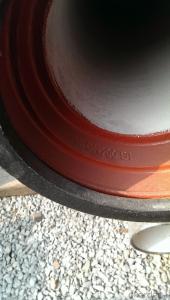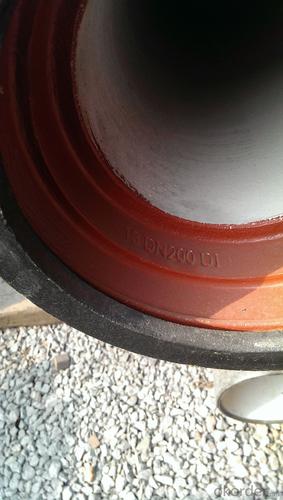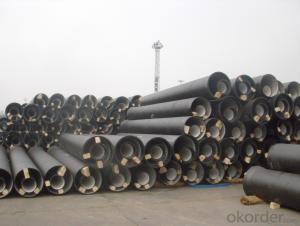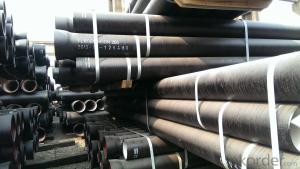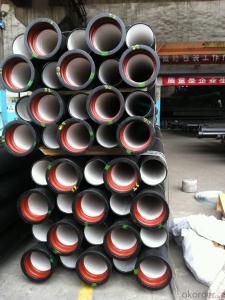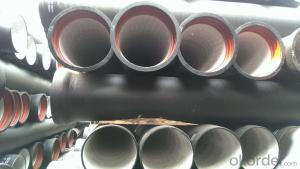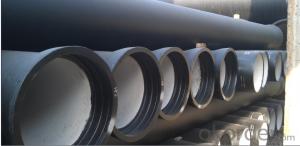DUCTILE IRON PIPE K9 DN 150 SOCKET SPIGOT PIPES
- Loading Port:
- Tianjin
- Payment Terms:
- TT OR LC
- Min Order Qty:
- 25 m.t.
- Supply Capability:
- 30000 m.t./month
OKorder Service Pledge
OKorder Financial Service
You Might Also Like
1) The standard of pipe: ISO2531:1998, EN545:2006,K9 K8
2) Effective length: 6m/5.7m
3) Inner cement line: Portland cement lineas per ISO4179
4) Zinc coating: at least 130g/m2 as per ISO8179
5) Bitumen painting: at least 70μm as per ISO8179
6)With 102% quantity of NBR, SBR, or EPDM ring asper ISO4633
7) DN80-DN1200
8) Highstrength, lighter than grey iron, good corrosion resistance, no furring, smallflow resistance, easy fixing, long life tome about 100 yeas
9)Checked by automatic inspection equipment
10) Composition:
Chemical composition | |||
Chemical composition | Ductile Cast Iron Pipe (%) | Grey iron pipe (%) | Steel pipe (%) |
C | 3.5-4.0 | 3.2-3.8 | 0.1-0.2 |
Si | 1.9-2.6 | 1.4-2.2 | 0.15-0.4 |
Mn | 0.15-0.45 | 0.4-0.6 | 0.3-0.6 |
P | ≤0.06 | ≤0.3 | 0.02-0.03 |
S | ≤0.02 | ≤0.1 | 0.02-0.03 |
Mg | 0.03-0.06 |
|
|
11) Feature:
Mechanical properties | |||
| Ductile Cast Iron Pipe | Grey Iron Pipe | Steel Pipe |
Tensile Strength(Mpa) | ≥420 | 150-260 | ≥400 |
Yield Strength(Mpa) | ≥300 | No Confirmation | No Confirmation |
Bending Strength(Mpa) | ≥590 | 200-360 | ≥400 |
Elongation (%) | ≥10 | Neglected | ≥18 |
Brinell Hardness(HBS) | ≤230 | ≤230 | About 140 |
12) T type mechanical joint
13) Packing: in bulk or container
PACKING: 1) Pipesare bundled together with the steel belt.
2) Wooden pieces are put between the pipes.
- Q: What is the average cost of ductile iron pipes?
- The average cost of ductile iron pipes can vary depending on factors such as the size, length, and supplier. However, on average, ductile iron pipes can range from $30 to $300 per linear foot.
- Q: Can ductile iron pipes be used for underwater installations?
- Yes, ductile iron pipes can be used for underwater installations. Ductile iron is a strong and durable material that can withstand the harsh conditions of underwater environments, making it suitable for various applications such as water distribution, sewage systems, and marine infrastructure.
- Q: Can ductile iron pipes be used in areas with high soil salinity?
- Indeed, areas with high soil salinity can accommodate the use of ductile iron pipes. These pipes possess notable resistance to corrosion, rendering them compatible with different soil conditions, even those with elevated salinity levels. Usually, these pipes are coated with a safeguarding layer, such as polyethylene or zinc, which bolsters their capacity to ward off corrosion caused by saltwater or saline soils. Furthermore, employing appropriate installation methods, such as meticulous backfilling and soil compaction around the pipes, can effectively mitigate the potential consequences of high soil salinity on the durability and effectiveness of ductile iron pipes.
- Q: Are ductile iron pipes suitable for gravity sewer systems?
- Indeed, gravity sewer systems find suitability in the utilization of ductile iron pipes. Numerous properties possessed by ductile iron pipes render them highly compatible with this specific application. To commence, the high tensile strength of ductile iron pipes allows them to endure the weight exerted by the soil and other burdens imposed on them within a gravity sewer system. Consequently, these pipes can effectively resist deformation and maintain their structural integrity over an extended period. Moreover, the exceptional corrosion resistance exhibited by ductile iron pipes proves to be of utmost importance in sewer systems, which are frequently exposed to severe and corrosive surroundings. In this regard, the corrosion resistance of ductile iron pipes guarantees their long-term durability, thereby minimizing the necessity for maintenance and repairs. Additionally, the presence of a smooth internal surface in ductile iron pipes permits the efficient flow of wastewater within gravity sewer systems. A smooth surface reduces friction and prevents the accumulation of debris and sediment, thereby diminishing the likelihood of blockages and enhancing the overall performance of the system. Furthermore, the high resistance of ductile iron pipes to external forces, such as ground movements or heavy traffic, renders them highly dependable for gravity sewer systems where the pipes may encounter various external stresses. In conclusion, the amalgamation of properties encompassing high tensile strength, corrosion resistance, smooth internal surface, and resistance to external forces establishes ductile iron pipes as a suitable and reliable choice for gravity sewer systems.
- Q: Are ductile iron pipes suitable for use in cooling water systems?
- Ductile iron pipes are indeed appropriate for utilization in cooling water systems. They exhibit remarkable strength and durability, rendering them impervious to the intense pressure and corrosive properties inherent in such systems. Furthermore, they possess the ability to withstand extreme fluctuations in temperature while delivering enduring performance. Additionally, ductile iron pipes exhibit commendable resistance to the proliferation of microorganisms, a crucial aspect in preserving the quality of the cooling water. Moreover, these pipes facilitate effortless installation and necessitate minimal maintenance, thereby constituting a cost-effective alternative for cooling water systems. In summary, ductile iron pipes represent a dependable and suitable choice for employment in cooling water systems.
- Q: What if the ductile iron pipe is broken?
- Ductile iron pipe rupture can be repaired by using a cast iron defect repair machine, that is, a cast iron defect repair device. However, the general use of iron defects repair equipment can be repaired welding, and will not affect its use. Ductile iron pipes are used for water supply, so if it breaks, it will not be easy to handle. Make sure that the main valve is closed and repaired.
- Q: Are ductile iron pipes suitable for wastewater treatment plants?
- Yes, ductile iron pipes are suitable for wastewater treatment plants. Ductile iron is a strong and durable material that is resistant to corrosion, making it an ideal choice for handling wastewater, which can contain various corrosive elements. Additionally, ductile iron pipes have high tensile strength and can withstand high pressure, which is necessary for transporting wastewater in a treatment plant. The flexibility of ductile iron pipes also allows for easy installation and maintenance, reducing the overall cost and time required for a wastewater treatment plant. Overall, ductile iron pipes are widely used in wastewater treatment plants due to their durability, corrosion resistance, and ability to handle the demanding conditions present in such facilities.
- Q: How many casting methods are there in ductile iron casting? A 60*6 discus can not have sand holes. Its surface is smooth. What process can be used to make it?
- Is it better to use precoated sand, but only a little higher cost?.
- Q: Can ductile iron pipes be used for river crossings?
- Yes, ductile iron pipes can be used for river crossings. Ductile iron is a strong and durable material that can withstand the stresses and pressures of being installed underground and crossing rivers. It is commonly used in water and sewage systems, including river crossings, due to its resistance to corrosion and its ability to handle high water pressure.
- Q: Can ductile iron pipe be used in corrosive environments?
- Ductile iron pipe is capable of being utilized in environments that are corrosive. Ductile iron is renowned for its ability to withstand corrosion and has been extensively employed in diverse applications where resistance to corrosion is necessary. The resistance of ductile iron to corrosion is attributed to the formation of a natural protective oxide layer on its surface, which acts as a barrier against corrosive substances. Furthermore, ductile iron pipes can be coated with different protective coatings such as polyethylene or epoxy to augment their resistance to corrosion. These coatings furnish an additional layer of protection, rendering ductile iron pipes appropriate for deployment in highly corrosive settings like wastewater treatment plants, industrial plants, and marine applications. Nevertheless, it is crucial to take into account the specific corrosive substances present in the environment and seek guidance from experts or adhere to industry standards to guarantee the proper implementation of coating and maintenance practices for long-term performance and durability.
Send your message to us
DUCTILE IRON PIPE K9 DN 150 SOCKET SPIGOT PIPES
- Loading Port:
- Tianjin
- Payment Terms:
- TT OR LC
- Min Order Qty:
- 25 m.t.
- Supply Capability:
- 30000 m.t./month
OKorder Service Pledge
OKorder Financial Service
Similar products
Hot products
Hot Searches
Related keywords
